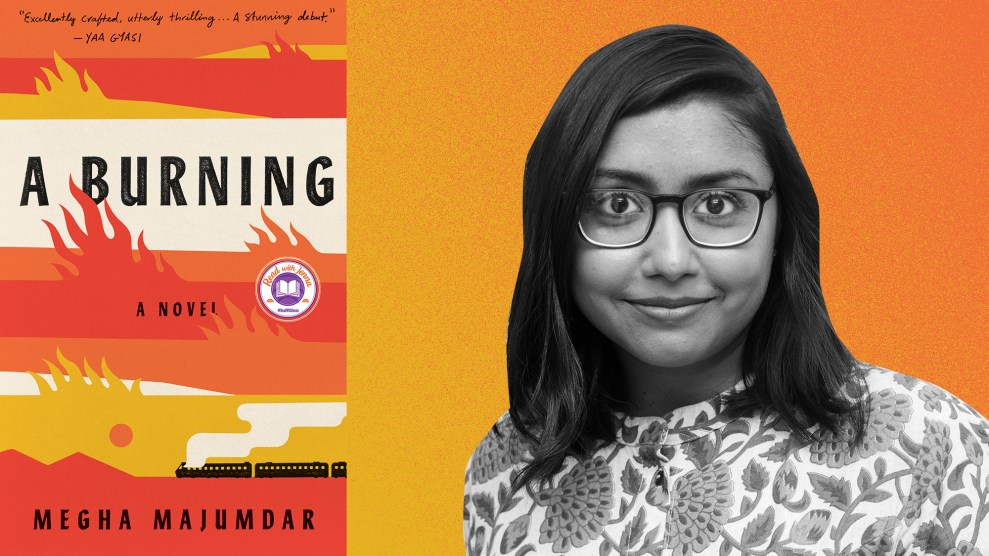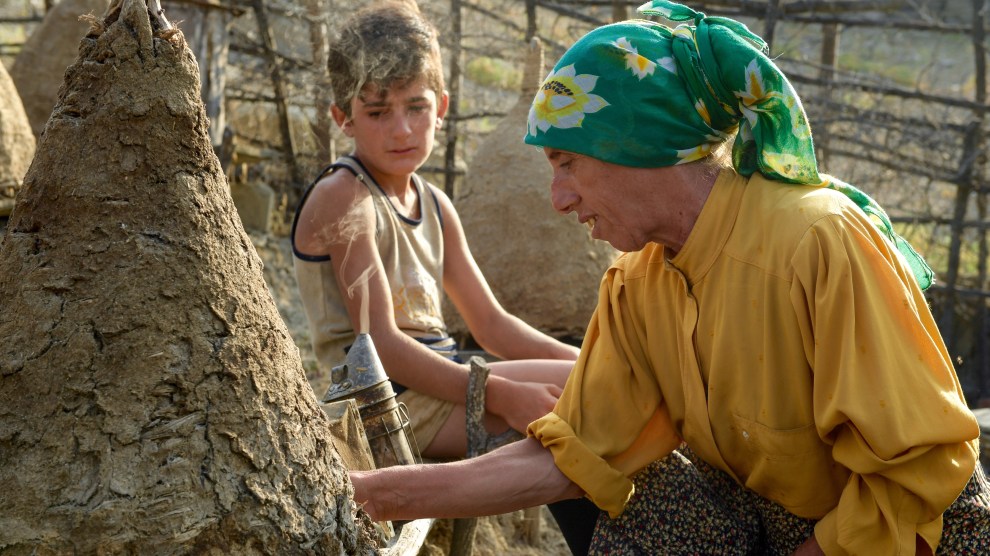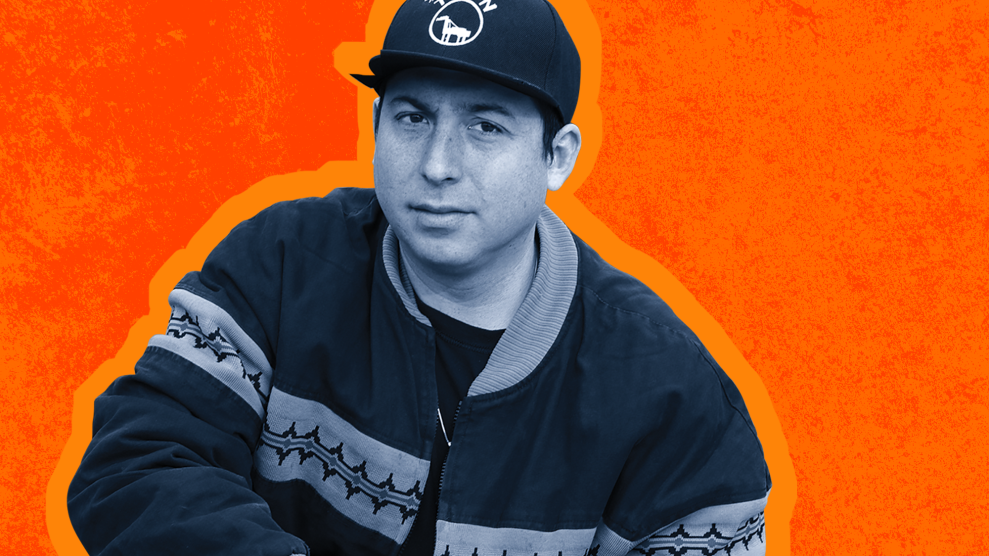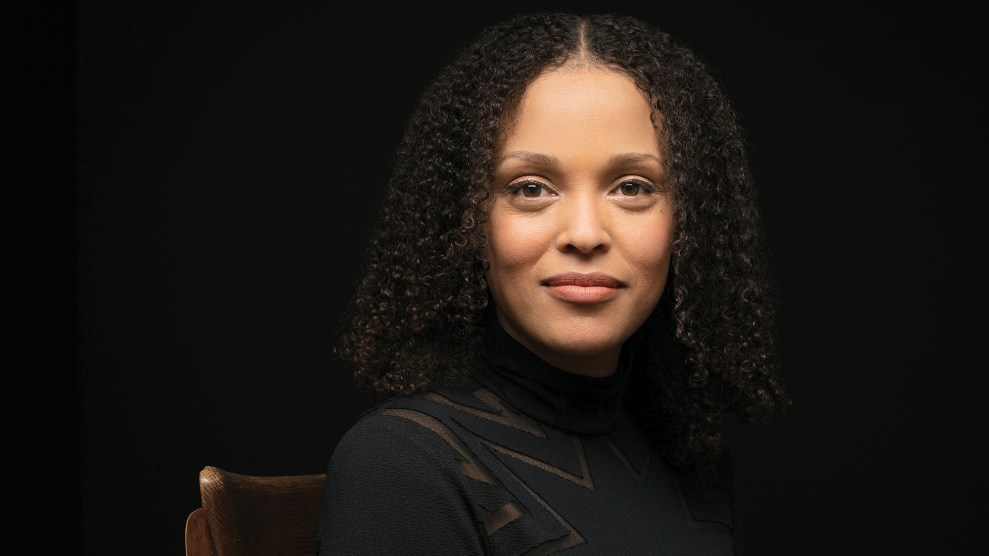
Mother Jones illustration; Elena Seibert
In the opening pages of Megha Majumdar’s new novel, A Burning, Jivan witnesses a terrorist attack at a train station in Kolkata, India. Scrolling through Facebook later, she sees a clip of a woman wailing that nearby police officers did nothing to save her daughter trapped inside a train. “If the police didn’t help ordinary people like you and me,” Jivan writes in a Facebook comment, “if the police watched them die, doesn’t that mean that the government is also a terrorist?”
While it’s very much about a specific place, there’s a universality to Majumdar’s debut novel—especially given that it’s landing during an uprising over racial injustice, in the middle of a pandemic. The events of this spring may have upended the author’s book tour, but in many ways they allow A Burning‘s themes of government corruption, justice, and class to resonate even louder.
Majumdar, who grew up in Kolkata but moved to Boston for college and now works as an editor for Catapult, an online literary magazine, started drafting the book during a time when she was thinking about how “governments bring systems of oppression to bear on marginalized people.” The plight of Jivan, a Muslim teen living in poverty and accused of aiding a terrorist plot after her fateful Facebook comment, makes up the story’s central thread; braided around it, we hear from PT Sir, a schoolteacher lured into a Hindu nationalist political party, and Lovely, an aspiring actress drawn to celebrity.
The novel’s momentum rarely falters, and its messages can be gutting. But I most relished Majumdar’s depiction of street life, a shimmering tapestry of lofty dreams and daily rituals and disappointments, where “pyramids of sweets” tend to “sour in the hot day.” I talked to her about this, as well as the rise of extremism in India and the future of pandemic literature, back in June, a few days after watching her read from her book over Zoom during a talk organized by Books Are Magic. This interview has been edited and condensed.
You said you started writing the book while thinking about “how governments bring systems of oppression to bear on marginalized people.” Was there a particular incident you had in mind?
I was paying attention to what was happening in India, where I grew up. I was watching the rise of extreme nationalism there, the rise in hate crimes. And I felt alarmed. I just wanted to look at how ordinary people survived this turn. How do people still hold on to big ambitions and how do they still live with jokes and humor and in a spirited way while society makes this turn around them?
India is a secular, pluralist society. And I think in recent years—although there’s a very long history to this—there has been a rise in anti-Muslim rhetoric and actions. If you read the Indian news, you’ll see news about Muslims being attacked and lynched for even just suspicion of having eaten beef—cows are, of course, sacred to Hindus. So there has been a rise in anti-Muslim sentiment. And then last year there was this law passed, which basically allows people from neighboring countries to gain Indian citizenship, but only if they’re not Muslim. So, you know, just this tying of religion to citizenship. This was not the country that we were taught to celebrate.
This book has so much to do with class. You grew up in Kolkata. Do you remember when you first started to notice social class?
I think that happens so early. I mean, I grew up middle class. We had everything we needed. I went to a good school. But, like, on the school bus going to school, you would look out the window and see kids washing dishes in the gutter. You have these little roadside sheds where you get inexpensive food. And you often have kids working at those places. So I think I was aware very early that not every child is going to school and not everyone is coming home and doing homework. Some people’s parents go to an office and some people’s parents work as bus drivers and bus conductors and you’re constantly in touch with people of all different classes. And so you go to get your school uniform made and you come into contact with somebody who’s like, measuring you, and you realize that here’s a person who looks like your father, looks like your uncle, but is going to work in a very different place. You cannot escape the reality of class stratification in India. You learn it very early.
What do you think led you to later study social anthropology?
When I started college, I had no idea what anthropology was. And then I realized that I was taking all of these classes about South America, about Russian Borderlands, about what was happening in Sudan at the time; Darfur was in the news. And I realized that all of these classes were within the anthropology department and I was really drawn to this idea with anthropology that you would work in a different place, and you can try to understand other people’s stories with complexity. I think that anthropology taught me a lot about nuance and contradiction and surprise within people’s stories.
It strikes me that it’s actually such great grounding for writing fiction. But it’s not that common that you see fiction writers who specialized in that.
Yeah. In grad school, I also studied anthropology and I spent a summer in Senegal following this USAID project, which was putting computers in public schools for the first time. And it was such a good reminder to see this, you know, object, which I think many of us in the US now consider tiring or exhausting, and people are talking about how to get away from their screens. But I went to this school in Senegal, and you see how it’s really seen as this portal to gaining new opportunities, a way to be connected to the bigger world. The kids and teachers that I spoke to were so excited about learning about scholarships and things like that, that they could now do because they had the internet. I think anthropology is so valuable just for paying attention to how other people live.
You mentioned this rise in right-wing ideology in India and the rise of Hindu nationalism. People have drawn parallels with this and the recent rise in white supremacy in the United States. I’m curious if you see any similarities with how these groups behave.
Absolutely. I think they’re both ideologies based on fears of being replaced by some other group, and, you know, notions of a “pure race.”
Your character PT Sir is seduced into one of these right-wing Hindu parties. You write: “A politician’s persona slips easily over his clean white shirt and khakis, the garland of flowers around his neck.” What did you look to for insight into how someone might be swayed by this extreme political stance?
I was drawing from stuff that I watched on local news growing up. You have footage of these political rallies and all of these people in the field, who are supposedly supporters, are actually just random people who were told to come to this field and they’ll get a box of fried food. That mix of fervor and skepticism is I think something that you absorb just from watching the news and hearing adults around you speak when you’re growing up.
And a lot of PT Sir’s character—I’m a novelist, so I made it up. I was very interested in seeing how I could write such a character, just this ordinary man who was disappointed that he doesn’t have this vigorous impact. On the contrary, you know, what will he do when he gets a little taste of political power? What morals will he hold on to and what will he surrender?
I love how you kind of used his wife as this foil or this embodiment of middle-class mediocrity. Like what she’s cooking is always so disappointing to him.
I tried to write her as such a voice of skepticism. You know, she’s very skeptical of this political party and she warns him not to get involved. But when you have a taste of feeling special in a country with so many ordinary people who are never going to rise in the way that you can, I mean, that is seductive. It’s very hard to say no to that. So I wanted to write this person who gets drawn deeper and deeper into really ethically murky acts, but is not a flat villain.
Definitely not. And Jivan is this poor young Muslim woman who’s arrested for alleged terrorism after she posts on Facebook. It seems like that’s not a very far-fetched premise that someone in her circumstances would be arrested for a Facebook post, is it?
People have gotten in trouble for making cartoons of politicians and posting them online. I think somebody got in trouble for liking a post that was criticizing a politician. So when you have vulnerabilities in your real life, it’s a complete myth that social media or the internet afford you freedom from those vulnerabilities. You know, I think this terrain where people think that they can say anything and do anything and it has no consequences—it’s just not true. You can carry those vulnerabilities over onto the space of social media as well.
I think India has the most number of Facebook users in the world. So there’s a huge population of new internet users, people who are gaining internet access for the first time, who are learning the ins and outs of how to use Facebook and WhatsApp and all of these messaging channels, and it’s fraught. This terrain has its own politics.
I’m curious how that line that Jivan wrote on Facebook—If the police didn’t help ordinary people like you me, if the police watched them die, doesn’t that mean that the government is also a terrorist?—came to you.
I was trying to inhabit the mindset of this young woman who is moving up in life. She has a job at a mall, she has her first new smartphone. She is getting a taste of comfort and freedom. And I think part of that freedom is the freedom to be outraged online. And I was interested in this idea of somebody who is luxuriating in this freedom to be moved by somebody else’s fate because her own life isn’t quite so dire anymore. Somebody who sees this terrain as a terrain of play; she wants more likes. And so from this place of hope, and perhaps, being naïve, I wanted her to say something that would be incendiary. But that would come from a kind of unconsidered careless place—a place that’s ultimately one of leisure, of just being on your phone and typing off something.
It’s interesting because you could almost boil down all three of the main characters’ core desires as: They want more likes. And that’s not out of place, either, when you look at modern culture.
What a summary!
But, as you say, that desire is much more weighted, or risky, depending on how you came into the world, or the circumstances you find yourself in. How would your three characters be experiencing the coronavirus pandemic?
What an interesting question. I think they would struggle in some ways. What your question makes me think about is, India imposed this pretty strict [coronavirus] lockdown. But apparently something that they didn’t think about was all of these migrant workers who work in the cities, but are from different rural regions, and they were stuck in the cities with no work. And you know, no wages and trains, were shocked that they couldn’t go home. It was this whole mess. And I think that definitely a character like Jivan who was dependent on work at a mall—if a mall is closed, I can imagine that she would be in a tough spot.
It’s hard to imagine India without this huge informal economy, with the street vendors and the chai wallahs and people selling muri on the trains.
Exactly. It’s such an economy dependent on that informal small cash transaction. It’s reliant on street life and on people asked to do small services. So it’s very hard when things shut down.
Is there anything giving you hope for India’s most marginalized people right now?
So after the citizenship bill that passed late last year, tying citizenship to religion, there were huge, really vast protests. In many cases, the protests were led by women. In many cases, the women who came out to protest were people who had never really seen themselves as politically active or, you know, protesters before.
So I think that’s something to be hopeful about. I mean, I think there are always forms of resistance and it goes from protesting to what the characters in the novel do, which is simply strive to have a better life. I think that’s a form of resistance to say that “I do not accept that I’m supposed to stay in this place in society for my life. This is my dream and I’m going to chase it.”
Storytelling and stories are used for good and evil in your book, but either way they seem to be the most powerful force shaping what happens in your characters’ lives. Jivan, for instance, says about a fellow inmate, “If she had received her chance to tell her story, how might her life have been?” But then again, toward the end of the book, while she’s still in prison, she asks, “What can words do? Not very much.” I wondered about this contrast.
I think it’s a contradictory thought, which I held in mind while I was writing the book, which is that for me—of course, I’m an editor, I write, books are my whole life, I think that they are so valuable. But at the same time, I’m very conscious of how books haven’t served many people; reading a book doesn’t necessarily concretely improve someone’s life. And there are lots of people who, like the kids that I mentioned earlier, were working rather than going to school at a very early age, for whom books haven’t done anything. I wanted to acknowledge that reality—that skepticism that books can improve everything, which I think can be a bit of an unexamined adoration. Sometimes it’s just not true.
People joke that we’re going to get so many bad pandemic novels out of this. But you wrote a tweet about how “a good pandemic novel will also be about corruption, democracy, this stage of capitalism, and I for one would want to read.” Say more.
I think that pandemic novels have the capacity to comment in really important ways on the state’s handling of the pandemic. I’m not imagining, you know, a story about a virus necessarily; I’m imagining a story that’s about the state’s response—that’s about how health care systems have been mobilized or health care disparities or how certain communities suffer. So I think you’re really looking at the state’s priorities and also how communities and neighbors have come together to help each other out, recognizing that there are areas where the state is failing them, so all of these mutual aid funds that have sprung up, which I find so hopeful.
Anybody writing literature about the pandemic has to reckon with these systems and has to ask a kind of political question or make a political statement. I love books that feel like they are rooted in our world, that feel politically ambitious.
















